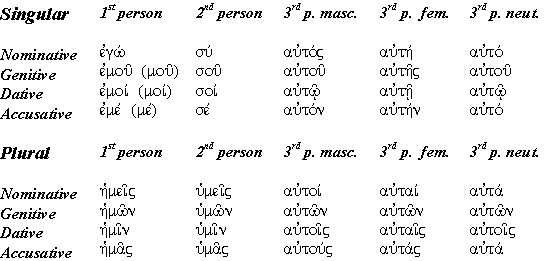
In the last section, we discussed the Greek cases, the use of pronouns, and nominative pronouns. This lesson continues our discussion of pronouns, focusing on accusative, dative, and genitive.
When pronouns are used as direct objects, they appear in the accusative form. Write the accusative forms from this table on a piece of paper:

Now let's use the flashcard gizmoto learn the accusative forms. Note that there are twoways to say "me" in Greek: emeis more emphatic than me, but they both mean the same thing.
And now let's try translating from English into Greek:
Now let's look at how accusative pronouns are used in various scriptures:
Before you translate this, you need to know whether "it" refers to a masculine, feminine, or neuter noun. In this case, they receive "the word" (o logoV), so it is masculine.
Notes:
When you translate the following, use legwfor the verb "to call":
When pronouns are used as indirect objects, they appear in the dative form. Write the dative forms from this table on a piece of paper:

Now let's use the flashcard gizmoto learn the dative forms. Note that there are twoways to say a dative "me" in Greek: emoiis more emphatic than moi, but they both mean the same thing.
If you see an "i" in a pronoun or noun ending, think dative. The iota is very characteristic for the dative; sometimes the letter iota is used, and sometimes an iota subscript is used. Since the flashcards don't do Greek fonts, we can't show an iota subscript, so we will use the "_" character to indicate that a letter has an iota subscript.
And now let's try translating from English into Greek:
Now let's look at how dative pronouns are used in various scriptures:
In this passage, Jesus is talking to a fig tree, which just happens to be a feminine noun. In the English, I have used the word "her" to remind you to use a feminine pronoun; naturally, a real English translation would call a fig tree "it":
The other cases all involve the relationship between a pronoun and a verb. The genitive involves the relationship between a pronoun and a noun or another pronoun - the genitive pronoun indicates the owner of something else. When I want to say that a book is "her" book, I use the genitive case.
Write the genitive forms from this table on a piece of paper:

Now let's use the flashcard gizmoto learn the genitive forms. Note that there are twoways to say "my" in Greek: emouis more emphatic than mou, but they both mean the same thing.
And now let's try translating from English into Greek:
Now let's look at how genitive pronouns are used in various scriptures:
I use the word "of him" in this word-for-word translation, but a real translation would say "his mother" - "His mother Mary was engaged to Joseph".
Again, "her husband" is a better translation than "the husband of her".